You can read this exclusive content thanks to the FALATH & PARTNERS law firm, which assists American people with Slovak roots in obtaining Slovak citizenship and reconnecting them with the land of their ancestors.
As a child, you are allowed some leeway when it comes to difficult things. Although Christopher Sanders heard stories about what was happening in Central Europe under communism, he didn't think about it too much.
He remembers when he was 12, his aunt was allowed to visit them in the US and he took her to a grocery shop.
"She just said 'Ježiš Mária' (Jesus Mary, a typical Slovak phrase for when you're shocked - Ed. note), got down on her knees and started crying. I was confused. Everybody was looking. She then told me she had never seen that much food in one place. Still, I didn't understand until I got older and learned about things," he says, adding that it was when he first saw West and East Berlin, visited museums, that he started to understand what the people went through.
Close to the end of her life, Sanders' grandmother told him to go and do something good for Slovakia. And so he went, and tries to keep that promise.
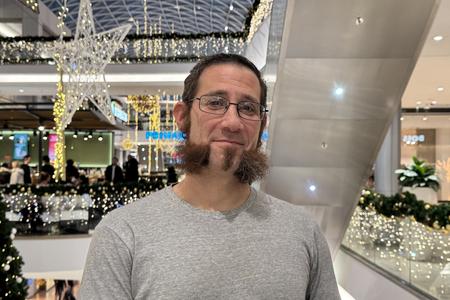
Growing up in the US
Born in Washington, D.C., with his sister, Sanders is a first generation American. His family emigrated to the US due to communism around the 1950s. First his grandmother, mother, and uncle went through the Czech Republic, France to the UK, where they boarded a ship to New York. Eventually, they were reunited with his great-grandfather and grandfather, who too managed to emigrate and settled in Washington, D.C.
"We all lived in the same house, in a area with a lot of immigrants from Eastern and Central Europe. We had Polish, German, Hungarian, Bulgarian neighbours, everyone. My grandfather was an engineer and in the military, but somehow managed to get out. My grandmother stayed home and cooked good Slovak food every day, we had the same traditions like in Slovakia. But she was kind of the boss in the house," he recollects.
With their English not so good, they used to speak to Sanders in Slovak, while he answered them in English. That was their way of learning the language.
"My Slovak grammar is like a little boy speaking. I understand Slovak, but more than I can speak," he says, adding that when he travels in eastern Slovakia the language situation gets sometimes complicated even more, despite being the same country, as people in different areas have a their own dialect.
His grandfather was a 'big history person' and would tell him about Milan Rastislav Štefánik, Jánošík, and the like. Basically, from him he learned all the things any child in Slovakia would learn. When he then told his American friends about the latter, for example, he would say he was like a Slovak Robin Hood. He even got a valaška as a little boy.
Growing up, Sander had friends who were refugees, not just from Europe, but also from Cuba, Nicaragua. "That was a really good educational thing. It was interesting watching my grandmother and my mum make friends so easily with a lot of other mums and grandmothers who had the same experience no matter the country they came from. Totally different cultures, but the stories were the same, a shared experience. The same hardship, struggle."
He attended a local school with a lot immigrant kids. However, he was told not to speak Slovak in it out of fear they might be considered spies. Back then in the US, people were afraid of that. "My grandfather was like 'Just say you're American. You were born here.' When we were told we could pick up Russian or Polish in school, he said 'Nope! Take something that will help you in America.'"
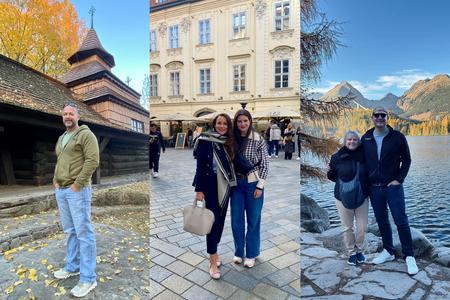
A return home
At home, he heard stories about what was happening in Central Europe under communism. He remembers getting phone calls from their Czechoslovak relatives and seeing his grandmother crying after hanging up.
When he eventually made his first trip back to Czechoslovakia with his sister and managed to rekindle relationships with relatives, he listened to their stories of how life was hard for them, how they were punished because part of the family left illegally.
"When I heard those stories, I got angry. You never understand the true suffering of people until you somehow experience it," he says.
His grandmother wanted to return back to her homeland to see it again after so many years, but by that time was too sick and old to travel.
"I told her some of the things. She told me that whatever I do, do it for her. 'You're very šikovný (ingenious), you're going to be able to do good work somewhere. Do good things for Czechoslovakia. A lot of people suffered so you could be born free in America.' My grandmother was very strong woman," he says.
"When my grandparents got to America, they had nothing. I can't even imagine it in my mind, going to another country where I don't speak the language, I don't know anybody. Then they built a life for themselves. I'm very appreciative of the risk my grandparents took running away from here because they wanted something better for their children and their grandchildren that weren't born yet. I figured the least I could do before I die is to keep this promise to my grandmother."
When his grandparents and parents died, he brought them back to Slovakia and buried them here.
Meeting Václav Havel
Upon graduating from college, Sanders studied finance and wanted to go work on Wall Street. But due to a big economic crash there were no jobs, so he joined the police force in Washington, D.C. Over time, he became commander of a special unit that protected the President of the United States, the Vice President and any official guest that visited.
One such guest was then Czechoslovak president Václav Havel, one of the leading figures of the political changes in Czechoslovakia in 1989 that led to the fall of communism.
Sanders was a lieutenant back then, and told his captain that as Havel meant a lot for him, he would like to take the job of providing protection for him. He ended up commanding the unit that was assigned to Havel during his visit in 1990.
"Every time, at the end of the trip when they get on the plane, they say thank you for the protection and safety. Since we took some of Havel's bodyguards to restaurants, got to know them and then they learned about my background, they then introduced me to him, saying 'Oh, this is Chris, he's from Czechoslovakia and he commands these guys'. And Havel started talking to me in Czech. All I was able to say was 'Hovorím ako malý chlapec' (I speak like a little boy). He started laughing, then he talked to me in English and took a picture with me," he recollects.
"It was really nice, a little surreal, a big honour. When I told my grandmother, she was crazy about it. I have the picture back in my house in America. A lot of people don't know him and when I tell them this story, they're like, wow. Without him, maybe it wouldn't be possible for me to be here now."
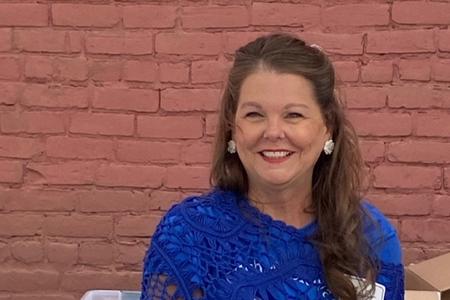
It's always halušky
Upon retiring, Sanders began his business career as the founder of an international consulting company dealing in intelligence and security with offices in Washington and Bratislava, as well as other locations in the world.
While their main office is in Washington, D.C., their main international office is in Bratislava. When his American friends ask him about it, especially knowing that the company also has offices in Vienna and Switzerland, for example, Sanders takes this as an opportunity to tell about the good things he has found in Slovakia: location in the middle of Europe, good infrastructure, and good people.
"Plus I like it here. You can't find halušky in America easily, right?" he says.
Together with his partners, they've invested a lot of time and effort here already, not to mention their success. They try to give back, supporting things in the community and helping charitable groups. A large number of Slovaks ask him why he decided to come to Slovakia. When he tells them the story about his grandmother, they have hard time believing it.
To illustrate the point, Sanders shares a story about meeting with people from the Trnava administration, whom he told he would like to help out, as his grandmother had been born in the Trnava area.
"I said that I know a construction company, we can do some project that I'll pay for. The city administration was like, 'Why?' And I said that my family comes from here, I have been successful in my life. Then I told them the story about my grandmother. 'What do you want in return?' they asked, to which I said nothing," he says.
"I understand the culture now. For them it's hard to comprehend why some American comes in the middle of Slovakia and wants to build a playground for kids or wants to fix the school or the Community Centre," he continues, adding that a lot of older Slovaks remind him of his grandparents, how they thought about things, not trusting outside people too much. Some friends say that Slovaks don't seem friendly, but then he explains that they have to get to know you better. Americans say hello a lot, even in a coffee shop. But Slovaks are not used to strangers being very friendly.
"Maybe it's a little bit of an old-fashioned way of thinking, but I believe that we only have so much time here. What am I going to do, hoard the money? If God blessed me with this, why not help? As I'm getting older now, I want to make the world better."
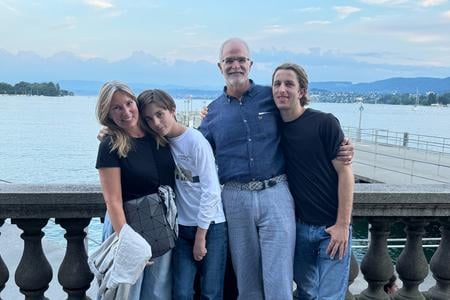
Help when you can
Sanders' sister also wants to obtain Slovak citizenship, but first wanted to make sure it worked for Christopher. She is a doctor with a medical practice in the US and is an expert in care for elderly people, but also does psychiatry and psychology and as such can work pretty much from anywhere. She now has to go through the process of getting her US medical license recognised. She is taking Slovak courses because the exam will be in the local language.
For Sanders himself, the process of obtaining the citizenship wasn't bad, though it was long.
Slovakia has changed a lot over the last 30 years or so, and for the better in Sanders' opinion. Being part of the European Union in his opinion also helped. If there's one thing that needs improving, it's immigration policy because it can help you learn a lot.
"I have travelled all over Slovakia, my friends love the nature here, the High Tatras. If you tell Americans that you have this here and it's not expensive like Switzerland, or Austria, they'll come," he explains, adding that being here also gave him the opportunity to experience history. It's not unusual to jump in a car, drive a little and find yourself in a place that was once a battlefield. "I think most Americans miss out on an opportunity to really experience history."
Spectacular Slovakia travel guides
A helping hand in the heart of Europe thanks to our Slovakia travel guide with more than 1,000 photos and hundred of tourist spots.
Our detailed travel guide to the Tatras introduces you to the whole region around the Tatra mountains, including attractions on the Polish side.
Lost in Bratislava? Impossible with our City Guide!
See some selected travel articles, podcasts, and traveller info as well as other guides dedicated to Nitra, Trenčín Region, Trnava Region and Žilina Region.


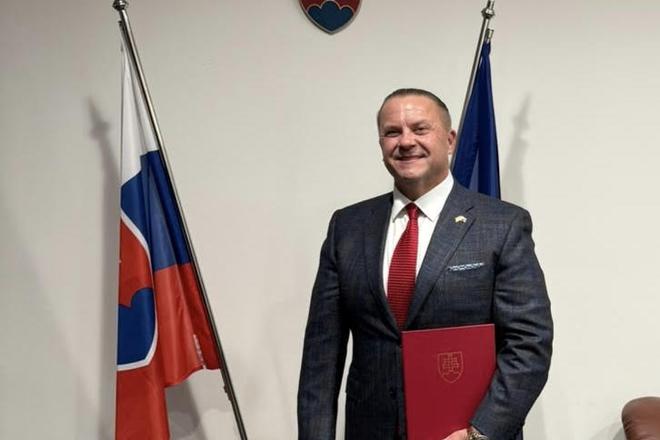 Christopher Sanders. (source: Archive of C. S.)
Christopher Sanders. (source: Archive of C. S.)
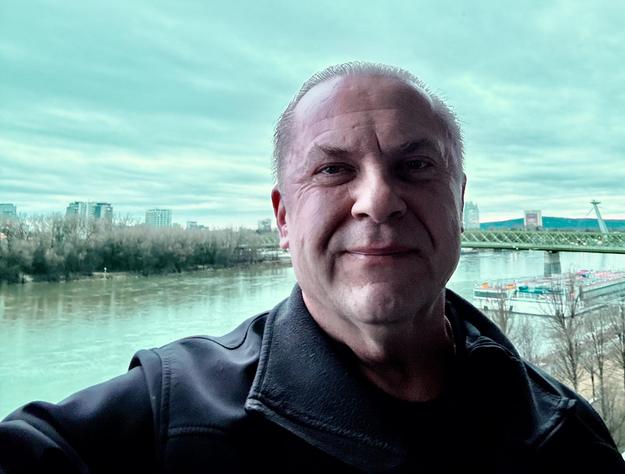 Christopher Sanders. (source: Archive of C. S.)
Christopher Sanders. (source: Archive of C. S.)
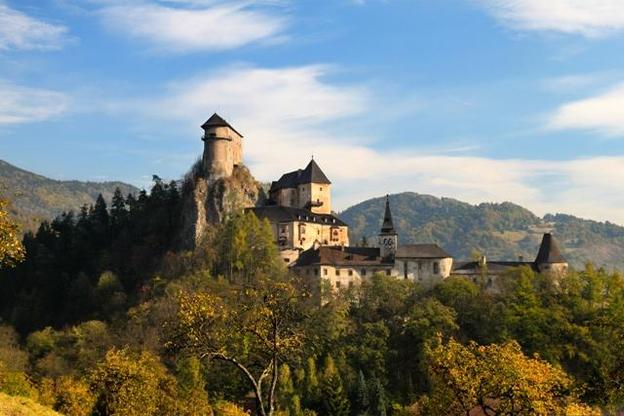 Orava Castle is one of the most impressive castles in Slovakia. (source: Michal Glonek)
Orava Castle is one of the most impressive castles in Slovakia. (source: Michal Glonek)